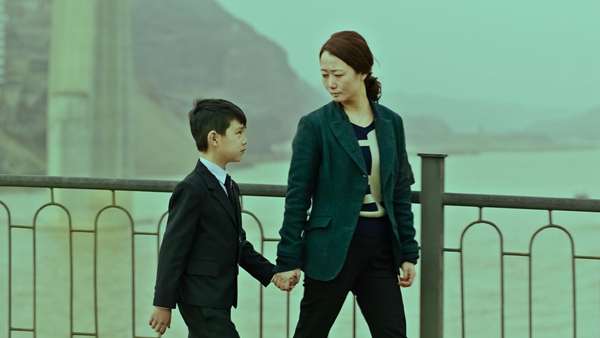2015-06-15
Jia Zhangke: MOUNTAINS MAY DEPART

The still of Mountains May Depart.
By DEREK
An ambitious, three-part attempt to portray changing relationships among a small group of people across 26 years, Jia Zhangke\'s MOUNTAINS MAY DEPART is set, like his first two features, XIAO WU and PLATFORM , in his hometown of Fenyang, Shanxi province, northern China. The film starts with a bang as a group of youngsters dance around during Lunar New Year 1999 to Pet Shop Boys\' anthemic version of the song "Go West" (a hit in China at the time). It\'s a powerful metaphor for their dreams of the future and the country\'s own aspirations as a new century is soon to dawn - and is continued in subsequent scenes as local schoolteacher Shen Tao (played by Jia\'s regular actress-muse Zhao Tao) joyrides with two friends: the dull but nice miner Liang Jianjun and cocky wannabe entrepreneur Zhang Jinsheng.
Forced to choose between the two, Shen Tao finally opts for money and the future over reliability and the past, marrying Jinsheng and dumping Jianjun. Fifteen years later, she\'s middle-aged and wealthy but divorced and lonely, her only child now in Shanghai with Jinsheng. Nine years later, the son is an English-speaking, 20-something slacker in Australia who can\'t get on with his father and enters into a relationship with a much older Overseas Chinese teacher.
The film is at its best in the first hour, with Zhao (usually cast in glum roles) refreshingly lively as the young schoolteacher and sinking her teeth into the thick Shanxi dialect. Wearing a signature red coat and rainbow-striped jumper - both almost luminous in the colour-saturated photography by Hong Kong\'s Yu Lik-wai - the 38-year-old actress cuts a vital presence that propels the film. Along with the equally lively Zhang Yi (the support-group head in Peter Chan\'s DEAREST ) as the cocky Jinsheng, and a quieter Liang Jingdong (from PLATFORM) as the taciturn Jianjun, the opening 55-minute section shows a more natural, accessible style of film-making by Jia after seven feature films.
Jia still manages to keep his style generally accessible during the second section, in which, though more low-key, Zhao actually looks more at home, playing a lonely divorcee in her early 40s. It\'s the abrupt change of both scenery and focus (and the switch to clumsy English dialogue) in the Australian section, set in 2025, that jolts the movie off the rails.
The decision to use ever-more-wide aspect ratios for the three sections (1.33, 1.85, 2.35) is a cute idea, as is the interpolation of documentary video footage here and there. Emotive use is made of a 1990 Cantonese song sung by Hong Kong\'s Sally Yeh called "Take Care" , which sums up the idea of friendship and parting in a moving way.
An ambitious, three-part attempt to portray changing relationships among a small group of people across 26 years, Jia Zhangke\'s MOUNTAINS MAY DEPART is set, like his first two features, XIAO WU and PLATFORM , in his hometown of Fenyang, Shanxi province, northern China. The film starts with a bang as a group of youngsters dance around during Lunar New Year 1999 to Pet Shop Boys\' anthemic version of the song "Go West" (a hit in China at the time). It\'s a powerful metaphor for their dreams of the future and the country\'s own aspirations as a new century is soon to dawn - and is continued in subsequent scenes as local schoolteacher Shen Tao (played by Jia\'s regular actress-muse Zhao Tao) joyrides with two friends: the dull but nice miner Liang Jianjun and cocky wannabe entrepreneur Zhang Jinsheng.
Forced to choose between the two, Shen Tao finally opts for money and the future over reliability and the past, marrying Jinsheng and dumping Jianjun. Fifteen years later, she\'s middle-aged and wealthy but divorced and lonely, her only child now in Shanghai with Jinsheng. Nine years later, the son is an English-speaking, 20-something slacker in Australia who can\'t get on with his father and enters into a relationship with a much older Overseas Chinese teacher.
The film is at its best in the first hour, with Zhao (usually cast in glum roles) refreshingly lively as the young schoolteacher and sinking her teeth into the thick Shanxi dialect. Wearing a signature red coat and rainbow-striped jumper - both almost luminous in the colour-saturated photography by Hong Kong\'s Yu Lik-wai - the 38-year-old actress cuts a vital presence that propels the film. Along with the equally lively Zhang Yi (the support-group head in Peter Chan\'s DEAREST ) as the cocky Jinsheng, and a quieter Liang Jingdong (from PLATFORM) as the taciturn Jianjun, the opening 55-minute section shows a more natural, accessible style of film-making by Jia after seven feature films.
Jia still manages to keep his style generally accessible during the second section, in which, though more low-key, Zhao actually looks more at home, playing a lonely divorcee in her early 40s. It\'s the abrupt change of both scenery and focus (and the switch to clumsy English dialogue) in the Australian section, set in 2025, that jolts the movie off the rails.
The decision to use ever-more-wide aspect ratios for the three sections (1.33, 1.85, 2.35) is a cute idea, as is the interpolation of documentary video footage here and there. Emotive use is made of a 1990 Cantonese song sung by Hong Kong\'s Sally Yeh called "Take Care" , which sums up the idea of friendship and parting in a moving way.







